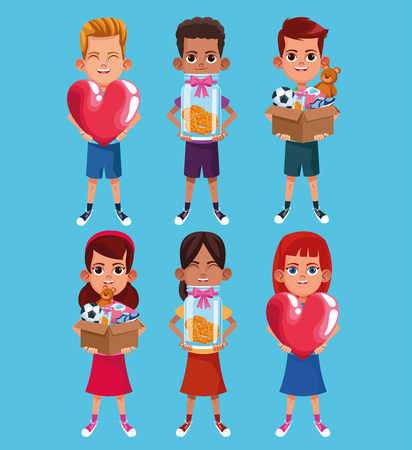Welcome to the Neighborhood Café
Coffee shops have long been a cornerstone of American communities, providing a cozy spot for friends to meet, students to study, and neighbors to catch up over a cup of joe. In recent years, however, there’s been a noticeable shift: cafés across the country are transforming into more family-friendly spaces, catering specifically to parents with young children. This rise in kid-welcoming coffee shops reflects changing social dynamics, where families are seeking inclusive environments that accommodate both adults and little ones. Whether it’s play corners stocked with toys, kid-sized seating, or menus featuring mini hot chocolates and healthy snacks, these cafés are becoming go-to destinations for parents eager to enjoy their daily caffeine fix without sacrificing quality time with their kids. The growing popularity of such spots highlights a new chapter in American café culture—one that values community, connection, and the joy of sharing everyday moments as a family.
2. The American Café Experience: Not Just for Adults
Once upon a time, American cafés were mostly seen as quiet retreats for adults seeking a caffeine fix or a work-friendly environment. Today, however, the landscape has shifted significantly. More coffee shops across the United States are recognizing that families—especially parents with young children—are a vital part of their customer base. This change reflects broader social trends that value inclusivity and community-oriented spaces. But what exactly does it mean for a café to be “kid-friendly,” and how have these businesses adapted to make everyone feel welcome?
Evolution of Family-Friendly Cafés
The transformation began as American family dynamics evolved and parents sought social spaces that accommodated both their need for relaxation and their childrens energy. Coffee shops started to integrate design elements and amenities catering specifically to families. These changes are not just about adding high chairs; they involve thoughtful planning that ensures safety, comfort, and engagement for all ages.
Key Features of Kid-Friendly Coffee Shops
| Feature | Description | Why It Matters |
|---|---|---|
| Play Area | Designated space with toys, books, or activities | Keeps kids engaged while parents relax or socialize |
| Child-Safe Environment | Rounded corners, non-slip floors, covered outlets | Prevents accidents and reassures parents |
| Family Seating | Larger tables, booster seats, high chairs available | Makes dining comfortable for families of all sizes |
| Kid-Friendly Menu Options | Healthy snacks, smaller portions, allergy-aware choices | Cater to diverse dietary needs and preferences of children |
| Stroller Accessibility | Wide aisles, ramps, parking spots for strollers | Eases movement for parents with infants or toddlers |
| Clean Restrooms with Changing Tables | Restrooms equipped with baby changing stations and supplies | Makes longer visits feasible and convenient for parents |
| No-Judgment Zone Culture | Staff trained in patience; welcoming attitude toward kids’ noise and messes within reason | Puts parents at ease so they can enjoy their visit without stress |
Cultural Shifts Behind the Trend
This evolution is more than just a marketing strategy—it reflects deeper cultural shifts in American society toward valuing family time and public spaces that serve diverse community needs. Cafés are increasingly seen as “third places”—not home or work but inclusive hubs where people of all ages gather. By investing in kid-friendly features, coffee shops not only broaden their appeal but also foster lasting loyalty among local families.

3. Mindful Manners: Teaching Kids Café Etiquette
Family-friendly coffee shops are wonderful places to introduce children to the art of social interaction outside the home. Parents play a pivotal role in guiding their kids to be respectful patrons, creating a welcoming environment for everyone. Here are some practical tips for teaching café etiquette that fit right into American coffee shop culture:
Use Your Indoor Voice
One of the key skills for kids to practice in a coffee shop is using an indoor voice. Remind your child before entering that cafés are shared spaces where people come to relax, chat, or work. Encourage them to speak at a volume similar to how you would talk at the library or during story time at school. If excitement rises, gently remind them with a phrase like, “Let’s use our café voices so everyone can enjoy their coffee.”
Respect Shared Space
Coffee shops often have limited seating and communal areas. Teach your child the importance of keeping personal belongings—like jackets, toys, or books—close by and out of walkways. Reinforce staying seated unless necessary, and help them understand not to run or play loudly near other guests’ tables. Model tidying up after yourselves by clearing dishes and picking up dropped napkins, which also helps café staff and shows respect for other customers.
Practice Polite Ordering
Ordering at the counter is a valuable opportunity for children to practice polite conversation and independence. Before reaching the register, discuss menu options with your child so they’re ready when it’s their turn. Encourage them to say “please” and “thank you,” make eye contact with the barista, and wait patiently while others order. For younger kids who might feel shy, parents can model the interaction first or prompt their child with simple phrases: “May I please have a hot chocolate?”
Consistent Encouragement Matters
Positive reinforcement is essential as children learn new behaviors. Offer praise when your child remembers their manners or successfully navigates ordering alone. Over time, these mindful habits will become second nature, making visits to family-friendly cafés enjoyable for both your family and those around you.
4. Navigating Naptimes and Snacktimes
When enjoying a family-friendly coffee shop, managing your child’s needs—whether it’s snacktime, naptime, or feeding time—can be tricky but totally doable with some thoughtful strategies. American cafes generally welcome families, but showing respect for the shared space is key to making it a positive experience for everyone.
Snack and Drink Management
Bringing snacks for your kids is often expected, especially if your little one has allergies or dietary preferences. However, try to avoid overly messy or smelly foods that might disturb other patrons. Here’s a quick guide:
| Snack Type | Recommended? | Why/Why Not |
|---|---|---|
| Sliced fruit (apples, grapes) | Yes | Low mess, healthy option |
| Crackers/pretzels | Yes (with napkin/tray) | Easy to clean up crumbs |
| Yogurt cups | Maybe | Can be messy; supervise closely |
| Sticky foods (peanut butter, honey) | No | Difficult to clean from tables/seats |
| Home-brought fast food meals | No | May conflict with café policy; strong odors linger |
Mess Control Tips
- Carry wet wipes and a small trash bag for easy cleanup.
- Use spill-proof cups and snack containers.
- Wipe down tables and chairs before you leave.
- If a bigger mess happens, let staff know and offer to help tidy up.
Breastfeeding and Bottle-Feeding Etiquette in Public Spaces
The United States legally protects breastfeeding in public, including in restaurants and coffee shops. Most American café cultures are supportive of parents feeding their babies as needed. Still, some tips help ensure comfort for you and those around you:
- If you prefer privacy, look for a cozy corner or ask staff if there’s a quieter spot available.
- A nursing cover is optional; use it only if it makes you feel comfortable.
- Bottle-feeding? Bring an insulated bag to keep milk/formula at the right temperature and dispose of used bottles responsibly.
- If heating milk/formula is needed, politely ask staff before using café equipment like microwaves—they may have health guidelines to follow.
Naptime Solutions on the Go
Cafes can get noisy during peak hours. If your child needs a nap:
- Bring a stroller or carrier where your child can rest comfortably.
- Select off-peak hours when the shop is quieter.
- A white noise app on your phone (with headphones) can help block distractions.
- If your child becomes fussy, step outside for a brief walk to reset before returning.
By planning ahead and being mindful of both your child’s needs and the café environment, parents can enjoy their favorite coffee spots while setting a positive example of family etiquette in public spaces across America.
5. Screen Time and Sharing Tables
In today’s digital age, it’s common for kids to have access to tablets or smartphones, even during a quick café visit. However, when enjoying family time in a coffee shop, balancing screen use with real-world interaction is key. Setting reasonable boundaries around device time—such as reserving screens for emergencies or special quiet moments—helps children stay engaged with their surroundings. Cafés are also community spaces where sharing tables is part of the experience, especially during busy hours. Encourage your kids to be mindful of others: keep devices on low volume or use headphones, avoid spreading out too many personal items, and leave enough room for other customers to sit comfortably. This also provides an opportunity to model positive social behavior, like greeting tablemates with a smile or politely asking if a seat is taken. By demonstrating consideration and courtesy in communal settings, parents help their children develop essential social skills that extend beyond the coffee shop—and create a more welcoming atmosphere for everyone.
6. Encouraging Little Independence
Family-friendly coffee shops are more than just places to grab a latte—they’re mini-classrooms where kids can learn real-world skills. Empowering children to interact with baristas, order their own drinks, and pay for their treats gives them a sense of agency and builds social confidence. In many American cafes, you’ll spot parents encouraging their kids to greet the barista, say “please” and “thank you,” or even hand over a few dollars at the register. These small moments help kids practice communication and money-handling in a safe environment.
Fostering Responsibility Through Participation
When kids are given tasks like carrying their tray, finding a seat, or disposing of their trash after snack time, they begin to understand the importance of cleaning up after themselves. This not only lightens the load for busy cafe staff but also teaches respect for shared spaces—a valuable lesson that translates well beyond the coffee shop.
Cultural Benefits in Community Spaces
In American culture, fostering independence from an early age is celebrated as a path toward self-reliance. Coffee shops that welcome families often provide child-sized cups, step stools, or simplified menus so young patrons can participate fully. Parents modeling polite interaction and encouraging kids to handle simple responsibilities help cultivate considerate future customers.
Building Lifelong Habits
Ultimately, letting children take an active role during cafe visits not only makes outings smoother but also plants seeds for lifelong habits of courtesy and self-sufficiency. It’s a win-win: kids feel proud of their accomplishments, and parents get to enjoy a hot coffee knowing they’re raising responsible little citizens—one cup at a time.
7. Being a Good Neighbor: Respecting the Space and Staff
When visiting family-friendly coffee shops with kids, being a considerate guest means more than just enjoying your latte. It’s about fostering a welcoming environment for everyone—staff, fellow patrons, and other families. One of the most important aspects is acknowledging the café staff. A simple smile or thank you goes a long way in creating positive interactions, especially when the team is helping accommodate your children’s needs or cleaning up accidental spills. Remember, kindness is contagious and sets a great example for your little ones.
Tidying up after yourselves is another key aspect of good café etiquette. While staff are there to help, picking up dropped napkins, wiping sticky spots from tables, or putting away high chairs shows respect for their hard work and consideration for the next customer. Encourage your kids to take part—it’s a teachable moment about responsibility and community.
Of course, even the best-behaved kids can have tough moments in public settings. If your child has a meltdown or loud outburst, respond with empathy—not just toward your child but also toward those around you. Gently guide your child outside if needed, apologize to nearby customers if the situation disrupted their experience, and return when things have settled down. Most parents have been there, and showing understanding helps build mutual respect among café-goers.
Ultimately, being a good neighbor in coffee shops isn’t just about following rules; it’s about contributing to an atmosphere where everyone—kids included—feels valued and welcome. Your thoughtful actions inspire others to do the same, making cafés true community spaces for all ages.

